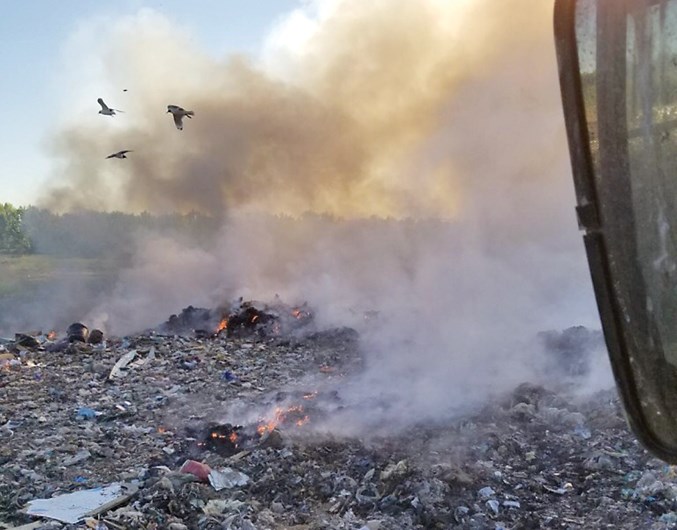A fire at the Westlock Regional Landfill shut down the main cell for a number of hours last week.
Westlock Regional Waste Management Commission manager Tom Moore said the blaze was extinguished around 3 p.m. after the fire department was called in just after 8 a.m., when he arrived at work July 12. There were reports of smoke at the location as early as 5 a.m., he said.
“The whole facility itself was not closed, it was just the landfill cell itself. We have a transfer station, we have recycling, we have a wood-burning pile, so we have a few things here, so we didn’t close the whole facility, because we try to accommodate the majority of the public,” said Moore.
The exact cause of the fire will likely remain unknown, due to the fact that Moore started to compress the cell to contain the fire as soon as he saw it.
While many landfill fires start spontaneously deep in a cell, due to the amount of organics that can create heat, this wasn’t the case with this fire, he said. It could have been any number of things, from lithium batteries, to hot ashes, or a cigarette butt. It could have even been a reflection of the sun in a vehicle’s mirror.
“One thing that’s tough at landfill fires is identifying exactly the cause ... We know it came in on a load that was just pushed the night before because it was right on top of the cell,” said Moore, the day after the fire, adding it consumed nearly half of the top layer of the landfill cell.
“We were fortunate, because of the proper management that we’re doing and because it was such a well maintained site, it was easier to fight it. The fire didn’t burn down, it burned laterally across the top because compaction helps with fire retention,” said Moore.
Moore admits they did have to turn a few people with larger loads away, but those with smaller loads were able to dispose of their trash at the new transfer station, he said, adding most were generally cooperative, but there were a few that were upset they had made the trip.
“The majority of the public was very cooperative ... We’ve never had a really big emergency like that here before, so we’ve never really addressed what to do. So we do have now some new policies and practices in place,” said Moore.
“We’ve looked at some of the challenges that we ran into and we’re making some changes. I’ll be working on revising some of the policies relative to this, to address some of the concerns we ran into.”
Unfortunately, the water used to put out the fire will contribute to the landfill’s overall leachate collection, which costs a substantial amount to remove and dispose of, said Moore, who added he is currently tallying up the cost of the fire.



